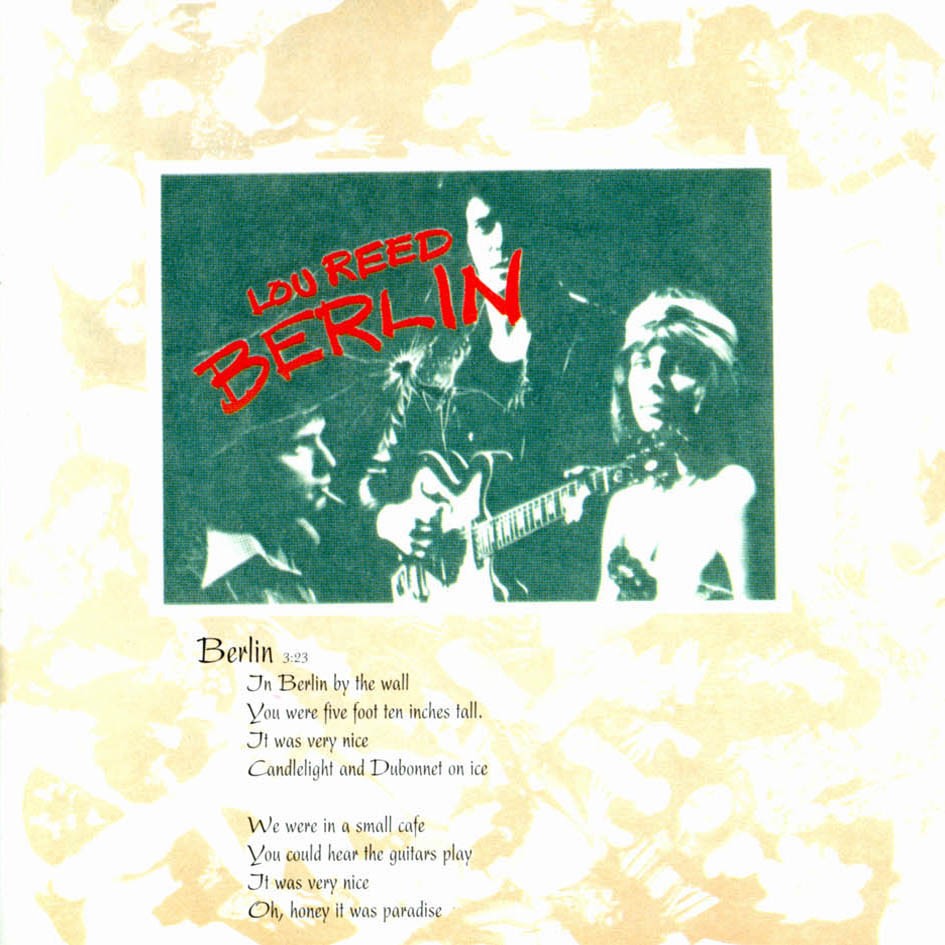9.

Lou Reed – Berlin
One of the reasons that I’ve chosen this is that I see that a lot of people haven’t chosen it. To me, this is probably my favourite Lou Reed record. I love the fact that he’s a great romantic. There’s such a fragility and intimacy in this record. Whenever I hear this record I always have a movie playing in my head, and so it becomes very personalised for me. It’s a very private record. A lot of these records that I’ve chosen are very private records that you have play in their entirety at home.
With a lot of these records, you do participate; you really got to listen. You can’t be doing something else or be distracted when they’re on. You don’t put Berlin on in the background. It’s not like, ‘Right, I’m going to the washing up and put Berlin on.’
One of my biggest regrets is that I didn’t go and see the Berlin live show – the Julian Schnabel production. I mean, I got the DVD and the book but I didn’t see it live.
‘Sad Song’ is one of the greatest tracks ever written. The string arrangement in that and the way it turns around at the beginning, with that flute or piccolo or whatever it is playing that beautiful melody, gives it a very baroque feel. There’s a lot of sentimentality here and he really is revealing a lot about himself. It’s so brave, so courageous. Sometimes music can be very muscular but on this record the real energy is from the heart. It’s probably through listening to this that enabled me to write ‘Life > Death’ on our new album.
There’s a lot of space in these records and they create an environment that you can really get into. Berlin is a claustrophobic album because it takes place in a very intimate environment. You can imagine it happening in any tenement building, but I should imagine that New York really influenced the imagery in this record. But it could also be like living in a Glasgow tenement and the lives that go on in there or any low rent place, and having profound feelings and introspections. It’s interesting that it’s called Berlin. He could be projecting what was happening in Berlin during the Weimar years. And the film Cabaret was a heavy influence on the glam generation. That came out in ’72 so you look at the stuff that came after that, like Berlin and all the way into punk rock. Even the krautrock stuff like Neu! and Kraftwerk.
Of course, Christopher Isherwood’s I Am A Camera was a huge influence on Cabaret and it’s interesting that he spent that time in the Weimar period among those kind of thinkers and what they were looking at. I mean these people were living Bohemian lifestyles that had nothing to do with the dogma and the science of the day. They were breaking all these conventions on things like sex and drugs.
I think conventions are being broken again. Some of the conventions being broken now are spiritual conventions and are moving off into other areas. You know, DMT, Terence McKenna, the whole idea of people gravitating towards the Amazon jungle and ingesting ayahuasca – it’s happening. People are walking away from the spectacle. More and more young people are talking about DMT and ingesting DMT.
An unenlightened individual would ingest ketamine and have some kind of cathartic experience and consider that that is the height of an expanded experience because they haven’t tried anything else. They haven’t been exposed to other substances that might be more beneficial for their spirit and environment. Like the idea of not doing it in a club with loads of alcohol in you. Doing ayahuasca in a controlled environment with a facilitator would give a purer experience. Interestingly, they banned magic mushrooms because of, ‘You can’t have young people having that!’ Once the doors of perception are cleansed then you’re not going to fall in line with this society that’s been put together. People have been ingesting mushrooms for millennia! They were pre-Christian religious sacraments.
Terence McKenna says every time there’s been a huge shift in consciousness in a culture there’s been some sacrament at its epicentre. You saw that shift in the 60s, absolutely. Going back to more archaic times – and I’m talking about The Bible – and the guys who wrote that, they were all tripping.


